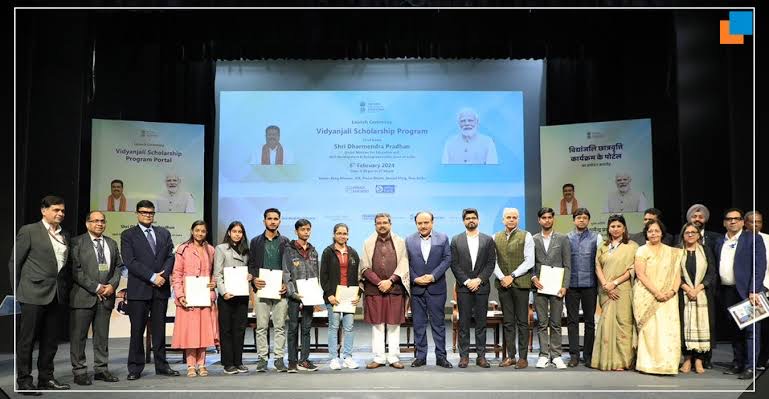Vidyanjali Scholarship Programme (India Today)

- 07 Feb 2024
Why is it in the News
Recently, the Union Minister of Education and Skill Development & Entrepreneurship launched the EdCIL Vidyanjali Scholarship Programme.
About the Vidyanjali Scholarship Programme:
- The Vidyanjali Scholarship Programme ensures equitable access to high-quality educational systems by facilitating a seamless transition from secondary to higher education and providing financial support to meritorious students from Navodaya Vidyalayas who lack financial means.
- It embodies a holistic approach to empowerment, aiming to expand educational opportunities, especially for students from economically disadvantaged backgrounds.
- The programme aims to secure assistance and funding from non-governmental partners and private sources, including CSR grants, national and international donors, and impact investors.
- Initially, the programme will benefit students in grades XI and XII studying in Navodaya Vidyalayas across the country.
- A dedicated fintech platform has been developed under Vidyanjali to disburse sponsorships to students through Direct Benefit Transfer (DBT).
- This platform plays a crucial role in data management, application processing, progress tracking, grant disbursement monitoring, fund utilization monitoring, generating impact reports for Sustainable Development Goals (SDGs), recognizing notable student achievements, and publicly acknowledging the support of funders, among other functions.
What is EdCIL?
- Educational Consultants India Limited (EdCIL) is the sole Public Sector Undertaking under the Ministry of Education, Government of India.
- Established on June 17, 1981, under the Companies Act, 1956, it holds the distinction of being categorized as a 'Mini Ratna Organisation' by the Government of India.
- EdCIL provides consultancy and technical services in various domains of education and human resource development, both domestically and globally.
- Its clientele includes numerous state and central government departments, public sector undertakings (PSUs), and autonomous bodies such as Indian Institutes of Technology (IITs), Indian Institutes of Management (IIMs), Indian Institutes of Information Technology (IIITs), Kendriya Vidyalayas, and Navodaya Vidyalayas.
